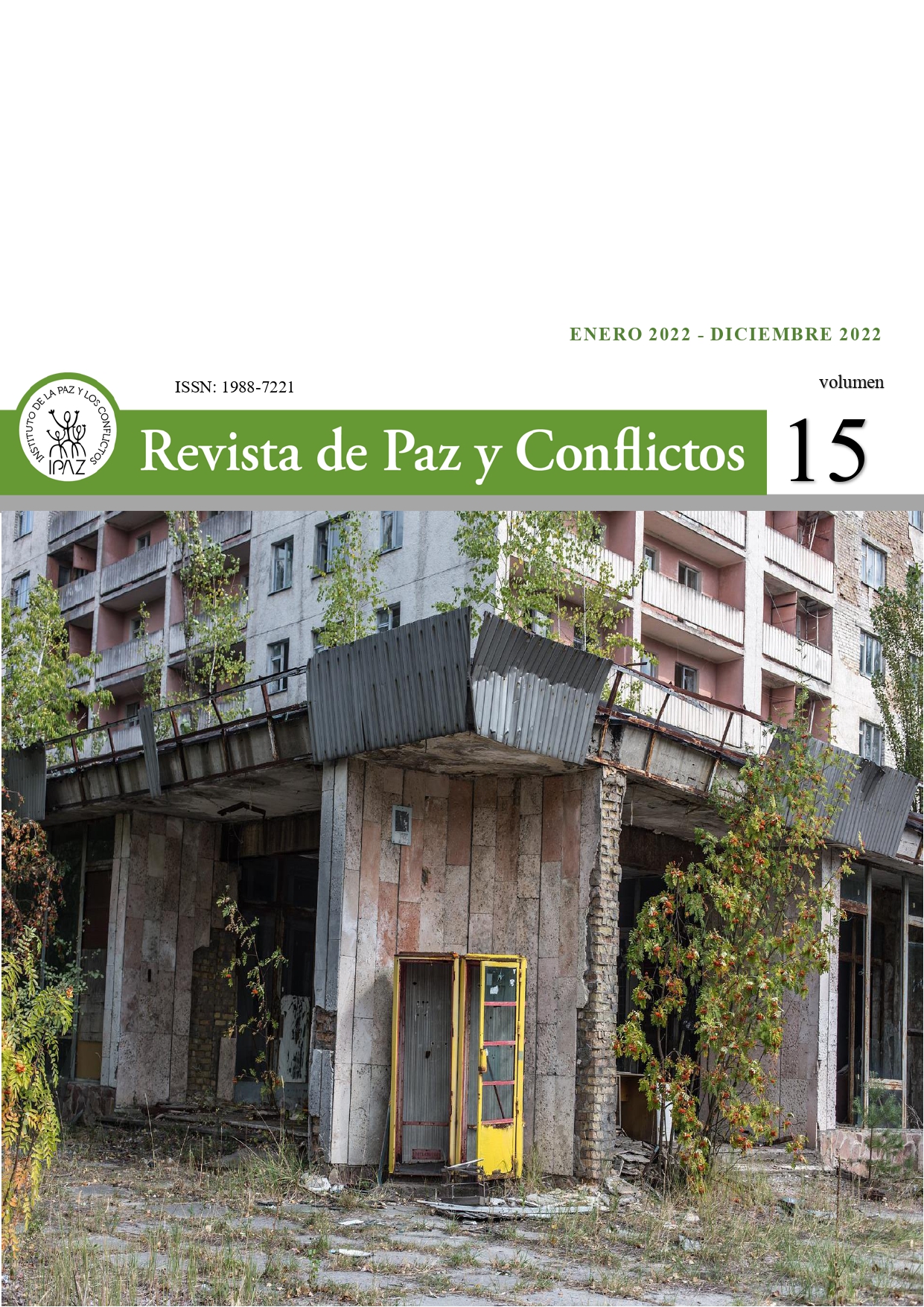A community power that builds peace:
Imperfect peaces and transformative powers in Southern Tolima
DOI:
https://doi.org/10.30827/revpaz.15.25310Abstract
Colombia has a long history of violence, but it also shows a renewed capacity to resist it. Proposals from women, men, and youth that address the way they were affected by the conflict have survived and emerged, as well as various peacebuilding strategies that arose in the midst of warfare. Likewise, associative strategies have been strengthened, as in the case of the inhabitants of Chaparral, Ataco, Rioblanco and Herrera (South of Tolima), who have developed organizations of coffee producers, organizations related to the care of the environment, women's networks, young peace builders, among others. Communities that, like many others in different parts of the world, have transformed their situations by exercising a transformative power in their environments.
The research work carried out with co-researchers of social organizations of the project "School, Territory and Post-conflict" has revealed the presence of different strategies that transform power and from where peace in the territories is acquiring different nuances, until giving shape to “Pluriverses of peaces” in the South of Tolima. Based on an undisciplined and participatory methodology, the research has shown how transformative power operates as a vision of future and is embodied in transformative strategies that impact territories.
Downloads
References
Barros Navarro, Nohora Isabel y Uribe Sarmiento, John Jairo (2019) La retaguardia en disputa, Ibagué, Ediciones Unibagué.
Aponte González, Andrés Felipe (2019) Grupos armados y construcción de orden social en la esquina sur del Tolima, 1948-2016, Bogotá, Fundación Centro de Investigación y Educación Popular (Programa por la Paz CINEP-PPP), Educapaz, Pontificia Universidad Javeriana.
Boulding, Kenneth Ewart (1993) Las tres caras del poder, Barcelona, Ediciones Paidós Ibérica.
Comisión de la verdad (2018) Los “Diálogos Improbables” de John Paul Lederech, una forma de construir confianza en los territorios. [En línea] https://comisiondelaverdad.co/actualidad/noticias/los-dialogos-improbables-de-john-paul-lederach-una-forma-de-construir-confianza-en-los-territorios, [Consultado el 20 de junio de 2020].
De Sousa Santos, Boaventura (1998) De la mano de Alicia. Lo social y lo político en la postmodernidad, Bogotá, Siglo del Hombre Editores y Ediciones Uniandes.
De Sousa Santos, Boaventura (2010) Para descolonizar Occidente. Más allá del pensamiento abismal, Buenos Aires, Consejo Latinoamericano de Ciencias Sociales CLACSO, Prometeo libros.
Duplat Ayala, Tatiana (2019) Paz en la guerra. Reconciliación y democracia en el Alto Ariari, Bogotá, Siglo del Hombre Editores, Universidad de EAFIT y Universidad del Rosario.
Galtung, Johan (1993) Los fundamentos de los estudios sobre la paz en Rubio, Ana (ed.), Presupuestos teóricos y éticos sobre la paz, Granada, Eirene y Universidad de Granada, pp. 15-45.
Giddens, Anthony (1984) The Constitution of Society: Outline of the Theory of Structuration, Cambridge, Polity Press.
Haber, Alejandro (2011) Nometodología payanesa: notas de metodología indisciplinada. Revista Chilena de Antropología, Vol.23, primer semestre, pp. 9-49.
Lederach, John Paul (2008) La imaginación moral. El arte y el alma de la construcción de paz, Bogotá, Editorial Norma.
López, Mario y Muñoz, Francisco Adolfo (2000) El poder pacifista. Instituto de la Paz y los Conflictos Universidad de Granada. Trabajo presentado en las I Jornadas de Investigación para la Paz celebradas en La Universidad Autónoma de Barcelona los días 27 y 28 de octubre de 2000, y organizadas por la Asociación Española de Investigación para la Paz. [En línea] https://www.ugr.es/~fmunoz/documentos/poderpacifista.pdf [Consultado el 12 de julio de 2020].
Muñoz, Francisco Adolfo (2004) La paz en Muñoz, Francisco Adolfo y Rueda, Beatriz Molina (eds.) (2004) Manual de paz y conflictos, Granada, Eirene, pp. 21-42.
Porter, Elisabeth (2012) Construir la paz. La experiencia y el papel de las mujeres en perspectiva internacional, Barcelona, ICIP.
Rodríguez, Iokiñe; Inturias, Mirna; Robledo, Juliana; Sarti, Carlos; Borel, Rolain y Cabria Melace, Ana (2015) Abordando la Justicia Ambiental desde la Transformación de Conflictos: experiencias en América Latina con Pueblos Indígenas, Revista de Paz y Conflictos, Vol.2, Núm 8, pp. 97-128.
Rodríguez, Iokiñe; Inturias, Mirna; Volker Frank; Robledo, Juliana; Sarti, Carlos y Borel, Rolain (2019) Conflictividad socioambiental en Latinoamérica: Aportes de la transformación de conflictos socioambientales a la transformación ecológica, Ciudad de México: Friedrich-Ebert-Stiftung.
Rosaldo, Renato (2000) Cultura y verdad: la reconstrucción del análisis social. (2000). https://digitalrepository.unm.edu/abya_yala/65
Sala Valdés, Cristina (2016) Recorridos de las comunicaciones para la paz: conceptualización, revisión crítica y propuestas desde la comunicación para el cambio social y la teoría de transformación de conflictos. [Tesis doctoral] Bilbao, Universidad de Deusto.
Sala Valdés, Cristina (2018) Medir la comunicación desde una perspectiva de cambio social y paz: propuestas pluralistas, análisis de marcos y enfoque sistémico en Marí Suárez, Víctor Manuel y Ceballos Castro, Gonzalo (eds.) Desbordes Comunicativos, Madrid, Fragua, pp. 111-135.
Trifu, Liliana Aura (2018) “Reflexiones sobre la paz positiva. Un diálogo con la paz imperfecta”. Revista de Paz y Conflictos, Vol.11, núm 1, pp. 29-59.
Downloads
Published
How to Cite
Issue
Section
License
Esta obra está bajo una licencia internacional Creative Commons Atribución 4.0.














